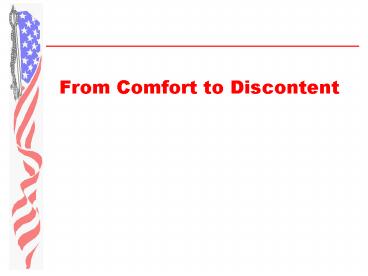From Comfort to Discontent - PowerPoint PPT Presentation
1 / 28
Title: From Comfort to Discontent
1
From Comfort to Discontent
2
Bell Ringer
- When do you think it is necessary for citizens to
rebel against their government?
3
Objectives of Lesson
- Explain how the Navigation Acts benefited
everyone but the New England colonies - Describe the events that led to the French and
Indian War - List the conditions of the Treaty of Paris
- Explain how the impact of the treaty on Great
Britain, Native Americans, and the colonists led
to the Proclamation of 1763.
4
I. Relationship between Europe and the Colonies
5
England did not have a plan when creating the
colonies
- South founded by profit-motivated companies
- New England founded for religious freedom
ABOVE Advertisement for Southern tobacco RIGHT
Puritan family seeking religious freedom
6
England did not have a plan when creating the
colonies
- 2 colonies were experiments
- Pennsylvania
- Founded by William Penn, a Quaker
- A place you could make your own laws
- Georgia
- Founded by James Oglethorpe
- A place for people in debt to start over again
ABOVE Contemporary poster of the Pennsylvania
Dutch, who still live in Pennsylvania
today RIGHT James Oglethorpe
7
B. Navigation Acts
1660 King Charles II enacted the Navigation
Acts on colonies
8
B. Navigation Acts
- Could only export crops/materials to England or
English colonies - Could only import manufactured goods from England
9
B. Navigation Acts
- 3. The plan worked well at first
- Southern planters sent tobacco, rice, and indigo
to England - Middle colonies sent extra grain to West Indies
to feed slaves - English manufacturers benefited from colonial
market
10
B. Navigation Acts
- 4. New England colonies did not benefit at all
- No crops to export
- Resorted to illegal trade with other countries
11
II. Battle over Ohio River Valley
12
Both England France claimed Ohio River Valley
13
B. 1753 France began building forts in the
valley
- Gov. of Virginia sent George Washington to warn
them of trespassing - France refused to move
A Cherokee with Forbes command scouts Fort
Duquesne in 1758.
14
C. Washington returned with militia to build
British fort
- Met French along the way, battle began
- Washington was surrounded surrendered
15
D. Natives saw French victory and decided to side
with France
Natives celebrate a victory over the British by
sporting their new red coats and other spoils
taken from defeated soldiers
E. Fighting spread into Europe, West Indies,
Africa, and Asia
16
III. French and Indian War
17
A. Americans called war French and Indian War
18
B. March to Fort Duquesne
- 1755 800 British troops, 600 Militia Men,
including George Washington, march to Fort
Duquesne - Bright red coats easy targets in forest
- French and natives fired from all around them
- 2/3 killed
19
C. 1759 British attacked Quebec
- Flat, open land (unlike forest) perfect for
British troops - Surprise attack led to British victory
The death of British General James Wolfe during
the Battle of Quebec, September 1759
British troops attacking the French Canadian
stronghold of Quebec in one of the most important
battles of the French and lndian War. This
painting by Sigmund Samuel depicts the September
13, 1759 surprise invasion by the British.
D. The British continued to defeat the French for
3 more years
20
(No Transcript)
21
IV. Treaty of Paris Proclamation of 1763
22
A. 1763 Treaty of Paris officially ended war
- France gave Canada to Britain
- Mississippi River Valley (called Louisiana) was
divided - Britain got part of Louisiana east of Mississippi
R. - Spain got part of Louisiana west of Mississippi R.
23
B. Great Britain became most powerful nation in
the world
24
C. Relations with Native Americans were poor
- They still remained loyal to France
- Accused British fur traders of corrupting their
people with rum and cheating them of furs - Noticed increase of British settlers spreading
west - Natives began attacking British forts and
settlements
25
D. British government declared Ohio Valley as
Indian Reservation
E. Drew a line along Appalachians through which
colonists could not pass
F. Colonists were furious
- Many planned to settle west
- Some invested in western land, now worthless
- Most only fought because wanted to move west
26
H. King George needed to send soldiers to America
to keep peace
G. War left England in debt
- Soldiers cost money
- Already raised taxes in England
- Colonies already showed reluctance to approve
taxes
27
E. The Quartering Acts
- After the war, the British government built up
troops in the colonies to protect them from
remaining threats from the French and Indians. - In 1765, Parliament passed the Quartering act
Colonies were to provide for the basic
needs(food, housing, bedding, beer, candles,
utensils, etc.) of the troops staying in their
territory. - Later, in 1766 the law even allowed soldiers to
be housed at taverns or unoccupied houses.
- British feelings on this act were mixed some
really wanted to protect the colonies many
wanted to cut costs in doing so also, the
colonies would be paying to support the war
veterans rather than Britain.
28
I. Colonists didnt understand need for soldiers
- No soldiers when French occupied territory, why
now? - Uncomfortable having British troops permanently
stationed in America - Suspected troops would force them to obey British
laws
J. Tensions between colonists and the King began
to arise
Later protests against the Kings taxes lead to
war.































